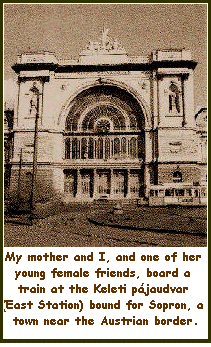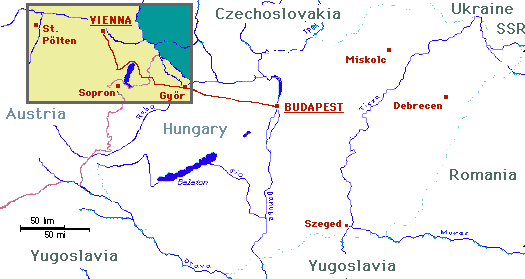![]()

|
|
 II.
The Trek
II.
The Trek

Sunday, December 30, 1956
Early Morning: My mother and I, and Ani, one of her young female friends, board a train at the Keleti pájaudvar (East Station) bound for Sopron, a town near the Austrian border. (See map below)
Most of the passengers are "dissidents" -- a euphemism
referring to those who are planning to escape -- but of
course, everyone has a perfectly valid reason for traveling
to Sopron. We are going to a New Year's pig roast at a farm!
As we head across the bridge over the Danube, I innocently
remark that we are going west. The passengers would like to
have killed me -- West is also the code word for escape!
While I am just repeating what I learned in geography (Pest
is on the east bank, Buda on the west bank of the Danube)
the passengers are obviously in no mood for a geography
lesson.
Midmorning: The military boards the train in
Györ and checks tickets and identification booklets.
They interview the passengers. Funny, they don't believe we
are going to a New Year's piggy roast! Our ID's are
confiscated and we are instructed to get off the train at
the next stop, Lébény. Trucks will be waiting
there which will take us back to Budapest, where our ID's
will be returned. They say we won't be imprisoned, but don't
bet on it!
Noon: We disembark at the little station called Lébény. Sure enough, we see the military trucks and people are climbing aboard. But wait! There is also a tiny bus, waiting to shuttle passengers from the station to the village square. We board the bus, as do many, many others. In fact, the bus becomes so crowded that there is not enough room to even raise our arms! There is much yelling and confusion, but we finally start moving, away from the station, away from the military.
The bus arrives at the village square and the passengers
literally spill out the open door. The doorways surrounding
the square are filled with curious villagers, studying us
carefully. We stand in the middle of the square, studying
them carefully. No one dares say a word, lest there be an
agent of the dreaded AVO (secret police) in either of the
camps. I can't recall how long this standoff lasted, but to
an eight year old, it seemed like an eternity.
Afternoon/Evening: Eventually, the ice is broken, people divide into groups, and each villager takes a group to his farmhouse in his pickup truck. There, we are fed, a price for escape is negotiated and I spend the afternoon playing with the other kids at the farm. I've never been to a farm before and I have much to learn - and oh, so little time. We are fed some more and retire for the night, many people to a small room.
Click on Inset below for additional detail

Monday, December 31, 1956 (New Year's Eve)
Some time during the day: Our host piles us into his truck and takes us over snow-covered back roads through the woods to another farm house. There, more truckloads of "dissidents" are converging throughout the afternoon. We are encouraged to rest prior to our overnight trek across the border, but who can rest? We are too excited! Even we children can sense the danger and uncertainty that lay ahead.
Evening: By nightfall, we are organized into groups of forty or so, including families, young and old couples and single people. Each group is led by a local guide. The groups depart on foot into the darkness at thirty minute intervals.
10:30 pm: It is our group's turn. We follow snow covered roads, occasionally through fields, but generally along rows of trees or through forests. In the distance we see bright points of light, ascending into the sky, then fading and disappearing. These, we learn, are flares that the border patrol fires into the night sky to see and apprehend the "dissidents". The flares are so distant at this point that they did not pose a threat to us.
We march onward, resting occasionally. I carry a small backpack filled with all my worldly possessions; my mother does likewise. I don't even remember what my those possessions were; probably some clothing and maybe some snacks. Some of the young men hang around my mother and her friend, both being single, and occasionally help carry our packs.
 Tuesday,
January 1, 1957 (New Year's Day)
Tuesday,
January 1, 1957 (New Year's Day)
After Midnight: The flares are definitely brighter now. The darkness turns brighter than a clear moonlit night. We are instructed to fall flat on our stomachs and lie absolutely still whenever the lights appear. This is to avoid being detected by guards scanning the area with their binoculars.
Choosing New Years Eve for our escape was intentional. Our idea was that the guards will be drunk and will not pay much attention to their work. But the frequent flares seem to indicate otherwise. It will only be a matter of time before we are discovered, and, at best, apprehended and returned to Budapest, or, at worst, shot and killed on the spot. Leaving Hungary is truly a great crime, and no punishment cane be severe enough. We must press on!
2:00 - 3:00 am: The flares are now so bright that the night virtually turns into day. We have by now lost all the buttons off our coats from the repeated dives into the snow and are also soaking wet and cold. The border is not far now. We hear that there will be a narrow creek, too wide to jump across, that we must cross on an icy log that will be our bridge to freedom.
4:00 - 5:00 am: Everyone is whispering now, lest the sound of our voices betray us. We climb up an embankment and below us is the creek! But our excitement is premature. The other side is still Hungarian soil; Austria is yet another 100 yards beyond. Our greatest challenge still lies ahead -- 40 people must cross the canal on a slippery log amidst those unceasing flares without detection.
Our bridge is actually two logs; one large one and one small one, the latter barely larger than a broomstick. Both are extremely icy. The best way across is to walk sideways, feet on the small log, while leaning against and holding on to the large one.
Miraculously, we all manage to cross. Some run across the top of the large log and, without hesitation, clamber up the embankment on the other side. Some straddle the log and cross the hard way! One of the men who has taken a shine to my mother, and who is somewhat inebriated, carries me on his back.
Once across, the pace picks up. We silently hurry toward
the forest that is supposedly Austria. The flares don't
matter any more; even if we are spotted, we'll be safe
before the guards can reach us. We are running now. My
mother is clutching my hand so tightly it hurts. The
wetness, the coldness, the weariness are suddenly forgotten;
adrenaline is taking over! We're in the woods now, still
running, until we reach an insignificant little snow covered
country road. A small sign on a tree, barely visible over
the deep snow, announces Österreich - Austria!
The West! Freedom!
|
I. Budapest, 1956 |
Return to Home Page |
III. Vienna |